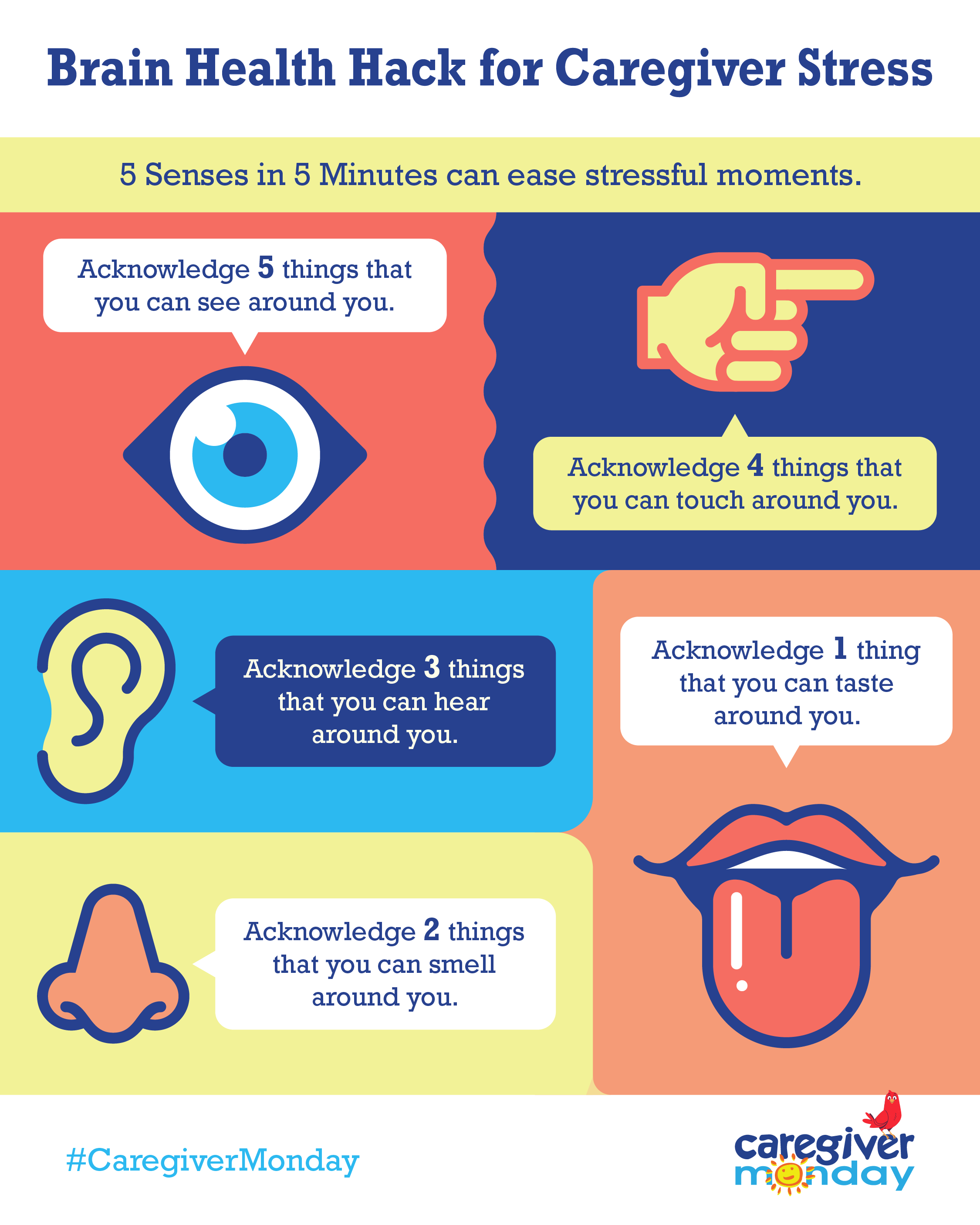What can help? The Caregiver Monday self-care plan
When the coronavirus became a full-blown worldwide pandemic, fear of this novel virus increased anxiety and stress for everyone. According to a Kaiser Family Foundation poll taken just one month into the coronavirus shutdown, 4 in 10 Americans reported struggling with negative mental health issues.
COVID-19 also changed the role of the nation’s 65 million family caregivers in the U.S. and increased their levels of stress and anxiety to much higher levels than the general population. The pandemic forced many caregivers into performing more hands-on duties as some long-term care services, such as adult day care, were closed. In addition, many caregivers were unable to visit vulnerable, high-risk loved ones in assisted living and nursing homes. All of these scenarios increased caregiver anxiety, stress and depression.
An October, 2020 report from the Rosalynn Carter Caregiving Institute found 83% of caregivers report increased stress while a Harvard University study found 4 in 10 caregivers were feeling increased psychological distress since COVID-19. In another study by the University of Pittsburgh, researchers found caregivers have had a 43% increase in anxiety, sleep problems and other health issues since the pandemic began.
One study by Blue Cross Blue Shield published in September showed caregivers had 26% poorer health than the general population due to the stress of their caregiving responsibilities during COVID-19. Among the health declines reported by these caregivers, millennial caregivers were 82% more likely to have hypertension, 60% more likely to have anxiety and 64% more likely to have major depression compared to non-caregivers.
Caregiver Monday can be a helpful tool to conquer caregiver stress
So how do we go from merely surviving to thriving while still fighting the coronavirus and waiting for a vaccine? Instead of allowing stress and anxiety to take over, the nonprofit public health Caregiver Monday campaign is dedicated to empowering caregivers in their own self-care. The program refocuses caregiver energy into simple, short self-care exercises to start every week with recommended activities every Monday.

Why Monday? Research shows Monday is our cultural reset button. People are predisposed to healthy behavior on Monday and are more likely to start exercise routines, eat healthier and schedule doctor’s appointments on Mondays, more than any other day of the week. Other studies found 64% felt if they start with a positive frame of mind on Monday, they are more likely to stay positive for the rest of the week. In the same survey, people reported that starting the week with exercise and healthy eating helps continue that behavior for the rest of the week.
For caregivers who may be overwhelmed with work-from-home disruption, possibly home schooling younger children and spending more hours caring for older loved ones – finding time for self-care seems difficult in an already overwhelming schedule. The Caregiver Monday program is based on activities that don’t require large blocks of time, are free and can be done by anyone, anywhere. Following is an example of a Caregiver Monday practice series that focuses on better brain health using some quick exercises of the five senses.
5 Senses in 5 Minutes – the Caregiver Monday “Brain Health Hack”

Recognizing brain health is important to overall health, the “Brain Health Hack” from Caregiver Monday takes a 5-minute tour of the five senses:
- The eyes – look for five items around you – some objects that are near and some that are farther into the distance. Concentrate on each of them visually for a few seconds. By doing this exercise, you flex your eye’s ciliary muscles by rounding the lens in your eye to focus on close-up items and then elongating the lens to see at a distance. Not only is it good for eye health but since the eye is connected to the brain via the optic nerve, it also helps stimulate brain activity.
- The hands – find four things you can touch. For instance, take a few seconds to pet your cat or dog or run your hands along a soft blanket or sweater. Focusing on a pet can have a calming effect and has been shown to lower blood pressure. Or wash your hands under warm, soapy water and really feel the calming effect of the water which helps to stimulate blood circulation. These activities also boost mood and energy.
- The ears – take a pause from all the noise pollution around you (incoming emails, tweet or text alerts, kids asking endless questions or a noisy TV) and step outside into nature. Listen for three different sounds. Maybe it is the rustle of the leaves in a tree, a bird singing or the sound of raindrops. Another option is to play your favorite upbeat song and singalong. Science points to singing as making music which is a full-brain workout involving all regions of the brain. One study found musicians have a 64% lower risk of developing Alzheimer’s.
- The nose – close your eyes and see if you can smell two different pleasant odors. Maybe it’s the rose bush outside your window or the warm cinnamon rolls in the oven. Aromatherapy is thousands of years old with ancient Egyptians, Chinese and even the famous Greek “father of medicine” Hippocrates using it for healing purposes. Try these two scents: lavender aids sleep and frankincense reduces joint pain and inflammation.
- The tongue – savor a favorite taste. For some it may be peanut butter, for others a crunchy apple, or Thanksgiving turkey and stuffing. Do like the French do and actually let your tastebuds really experience the texture and the flavor of a favorite food or snack, let it linger on the tongue. To reduce anxiety, try grilled salmon (which contains nutrients that regulate neurotransmitters dopamine and serotonin), sprinkle turmeric on veggies or in a soup (lab studies show it reduces anxiety levels in mice) or indulge in dark chocolate (which contain flavanols to improve blood flow to the brain and has a calming effect).
The Caregiver Monday campaign offers new practices every week to prompt caregivers to not neglect their own health needs. Now more than ever it is essential to balance caring for ourselves as much as we care for loved ones. Find all the resources, partners and other information at: Caregiver Monday.


